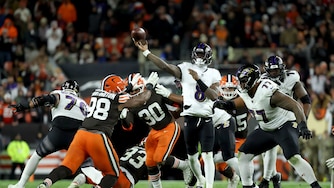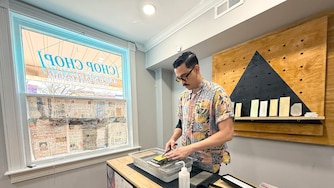Jordan Westburg spoke quietly, as is his way. He huddled in his chair and faced his locker in the visiting clubhouse at Nationals Park in Washington. Reporters milled about. One other player, Jorge Mateo, remained.
He was, fittingly, playing solitaire.
Westburg was talking about leadership. In particular, he reflected on the different ways players can display leadership and how the Orioles are still mastering all those avenues.
“There’s a learning curve,” Westburg said. “I’m trying to go through it right now. I think everybody in this clubhouse who has not been in a role like that is going through it.”
“I think it’s going to evolve. There are a lot of guys who are potentially really good leaders in that clubhouse.”
Orioles manager Brandon Hyde
Every season, roster turnover changes the dynamics in a clubhouse, especially when veteran players depart. Austin Hays, James McCann, Rougned Odor and Anthony Santander are no longer here. In their place are, in large part, high-profile players navigating the change from prospects to regulars. That change extends beyond the diamond.
As the Orioles have limped to a 10-14 start, characterized by inconsistent hitting, shaky starting pitching and shoddy defense, fans are waiting for the breakthrough moment when the team lifts itself out of this early-season funk.
Read More
So are the coaches.
Manager Brandon Hyde has noted at various times how the dugout fell quiet when the team was faced with an early deficit. The snowball effect has struck individual players, too, as one bad at-bat turns into a second or a poor game carries into the next night. Bench coach Robinson Chirinos, who was a veteran leader as a player in 2022 and a mentor to Adley Rutschman, said Hyde is “challenging not only Rutsch, but the whole team, to be more vocal.”
For all the high-profile stars, for all the expectations for a postseason run, the first month has been arduous. And it has been a crash course in stepping into a leadership role — and accepting the limitations of each personality in the clubhouse.
So, without the trusty veteran voices of years past, there’s more responsibility on this cast of maturing big leaguers.
Take Rutschman, for example. He’s the face of Baltimore’s rebuild — the first overall draft pick in 2019 and first selection of Mike Elias’ tenure as general manager. His arrival in 2022 elevated the Orioles, and, since then, they’ve won more games than they’ve lost. At catcher, he’s a field general.
“Whether he likes it or not, because of who he is, he’s a leader,” said infielder Ryan O’Hearn, whose voice also carries weight. “We need our stars to be stars. We need Adley to be Adley and Gunnar to be Gunnar, and down the list you go.”
For better or for worse, Rutschman and Gunnar Henderson tend to be lead-by-example types. They aren’t ones for on-field outbursts and clubhouse rants. The same goes for Westburg.
During the first month, the poor play from Baltimore has called into question several aspects of the team, from Elias’ roster building to the mettle of a cast of players used to winning all their lives. The response to the latter point, overwhelmingly, has been to preach patience. There’s prudence there.
But, as losses stockpile and players become more bewildered as to why, the leadership point comes into greater focus. For each new clubhouse, the dynamic changes. And this new iteration of the Orioles is still finding its voice — and doing so in an authentic manner.

“Some people are blessed with the ability to talk in front of a group and are extreme motivators,” Rutschman said. “That’s a gift. That is definitely a gift. That’s probably the hardest one. But everyone can lead by example, can have conversations with people individually, ask them how they’re doing and talk stuff out. But again, if you’re in a group setting and something is heavy on your heart, say it.”
‘I think it’s going to evolve’
When Rutschman arrived in the minor leagues, the outside expectations could have weighed him down. He was viewed by many fans as the savior of an organization beginning to rebuild.
He instead focused on his internal expectations, revolving around how he could help his team that night. What did his pitcher need? What could he do to manufacture runs? He’s the same way when it comes to discussing his role as a leader at the major league level.
“I don’t say, ‘Oh, I need to be a leader on this squad,’” Rutschman said.
He’ll let it come naturally.
“For me, it’s about how can I have an impact on people on a daily basis, and how can I have a positive influence around the clubhouse and on the team,” Rutschman said. “How that comes out is in different ways. It’s in having conversations with individual guys. If we’re in a meeting or something, and if it’s not in my heart to say something that day, I’m not going to try and manufacture something that’s inorganic.”
That is the central idea from many within the Orioles’ clubhouse. To be someone else, to be inauthentic, might do more harm than good.
Some may discover they are up to the task. Hyde said, as the season progresses, the clubhouse dynamics of leadership will emerge.
“When you’re struggling and you’re not putting up the numbers you want, the team’s not playing their best baseball yet, it’s not the easiest for guys who haven’t had a lot of time in the game to speak up and say stuff,” Hyde said. “I think it’s going to evolve. There are a lot of guys who are potentially really good leaders in that clubhouse, and really good players. We have a ton of confidence in them. I think, as we go over the course of this season, I think we’ll see more guys step up into that role.”
But for some players that role will be limited by their personalities. There’s no other way around it.
That doesn’t mean Westburg and others won’t find their own ways to lead, even if it’s a quiet word to the side.

“You know me. I’m not going to be as vocal as — or I’m not going to be able to be as vocal as, like, James McCann,” Westburg said. “Or let’s throw anybody’s name out there. Because it’s just not who I am. I’m not going to be a guy who is going to try to change his DNA. I’m not going to be a guy who tries to change on the outside, knowing that’s not who I am. It would come off as ungenuine to the rest of the guys, and I owe it to them to be as genuine as I can be.”
The goal for Westburg, then, is to figure out how he can assert himself even if he’s not the “rah-ray guy.”
“Can I be vocal in meetings? Can I be vocal in the clubhouse? Yes, certainly. I feel comfortable,” he said. “But there’s a learning curve for each and every one of us to find what role do we fit in, how do we best serve the team, and sacrifice some of ourselves to serve the rest of the guys in here.”
A rare show of flash
This month, one swing from Rutschman seemed to serve as the sort of lead-by-example methodology he’s more prone to employing. Rutschman cranked a game-tying home run against the Toronto Blue Jays, then turned and looked at his dugout before flipping his bat away.
It was a rare moment of flash from a player who generally avoids such displays, and Rutschman was almost embarrassed by it when asked about the bat flip. He reverted to his usual viewpoint — he was happy for the team, he said.
But the moment wasn’t lost on his teammates. Outfielder Cedric Mullins said, “Adley delivered exactly what we needed there. Not only with the home run but with his attitude.” Bryan Baker, a reliever who was in the dugout after pitching, said, “that was a big moment for him.”
It spurred his teammates forward in one of Baltimore’s few comeback wins this season. Although it didn’t compound into a winning streak, it showed what Rutschman can do in the public eye.
What he and others put weight on, however, is what they do behind the scenes. Rutschman said there’s value in professionalism — in arriving early, following a routine and not letting last night’s events skew his outlook. Even as Rutschman scuffled through the second half of 2024, he could at least control his attitude.
“Showing up and going through your routine and showing everyone you’re not quitting just because you’ve had a few bad days, he’s always been that way,” Baker said. “Having that presence in here and having it at the catcher position is such a big deal.”
And Rutschman knows it. More than being a former first overall pick, Rutschman puts pressure on himself to be a positive presence for eight other players on the field.
“Baseball is a tough game. You have an 0-for game, there are definitely times where I want to throw some stuff, you know what I mean?” Rutschman said. “But I want to have a positive impact on people, and I want to flush that AB and flush that game and move on. … When you’re on the field, eight guys are looking your way and you’re the only one looking out. Your body language is huge. Everybody is looking at you. The pitcher is looking at you. You have a responsibility to carry yourself with the most positivity.”
‘I think we have good voices in here’
When naming leaders of old, the obvious ones crop up. Hays, Santander, McCann, Chirinos. But Odor, in 2022, was one as well. He helped to make baseball fun when the Orioles were still a losing club.

Early that season, prior to Rutschman’s promotion and the winning baseball that followed, Odor brought about a home run chain. Odor was a central figure in creating the binoculars celebration for each hit, in a nod to the video game “Call of Duty.”
He was the king of clubhouse culture.
The Orioles don’t necessarily need that sort of player to turn around vibes, although that helps when the dugout feels flat. Positivity can be difficult to come by, particularly when injuries pile up nearly as rapidly as the losses. To this point, the Orioles haven’t openly expressed the need for a players-only meeting.
Outfielder Tyler O’Neill, a free agent acquisition, said some clubhouses benefit from those rallying speeches. In others, there is less of a need for them because players understand the situation on their own.
“I don’t think those things are kind of necessary,” O’Neill said. “Obviously, we all know where we’re at. We obviously all need to do a better job, specifically myself. It’s just a day-by-day process. All we can do is work hard and show up the next day and try to win a ballgame.”
After all, there are 138 games remaining. There’s time for a turnaround, and while Baltimore’s clubhouse is still enduring the learning curve ahead of embracing new leadership roles, O’Hearn and others see the potential for new leaders to emerge.
“I do think we have leaders in here, I think we have good voices in here, maybe coming from places you wouldn’t expect,” O’Hearn said. “But, I mean, it’s a collective group of guys who know where we want to go and we just need to show up and play. We can talk about it all day long, but we know what we need to do. Let’s go do it.”
So perhaps Westburg speaks quietly. He did so Wednesday afternoon when discussing the leadership questions thrown his way in a clubhouse empty of other players.
But quiet voices echo loudly in the correct room. Perhaps in their own way, these Orioles will find their leadership roles.
“We’re coming to the ballpark, and we’re going to figure this out,” Westburg said. “We’re going to see who kind of fits into that role, who kind of steps up. We have an idea, obviously. It’s not like we’re without leadership. That’s not what I’m saying at all. We have plenty of leaders in here, or guys who have leadership ability. It’s about figuring out how the heartbeat of this team pumps and flows.”





Comments
Welcome to The Banner's subscriber-only commenting community. Please review our community guidelines.